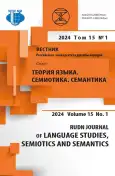Semantics of the Birth Myth as a Cultural Code
- 作者: Stepanova E.S.1
-
隶属关系:
- Samara State Medical University
- 期: 卷 15, 编号 1 (2024)
- 页面: 292-304
- 栏目: DISCOURSE & CORPUS STUDIES
- URL: https://journal-vniispk.ru/2313-2299/article/view/323654
- DOI: https://doi.org/10.22363/2313-2299-2024-15-1-292-304
- EDN: https://elibrary.ru/GICOFN
- ID: 323654
如何引用文章
全文:
详细
The study analyzes the birth myth from the symbolic point of view as a way to indicate the beginning of any existence, real or fictional: the birth of the Universe and a man, which sets out the primary understanding of the world and a man, time and space. The purpose of the analysis is to study the semantics of the birth myth, which reflects the archaic ideas of a person about birth, which made it possible to present the typology of the birth myth as a cultural code. The methodology of the study is based on the works by foreign and domestic scientists in the field of studying the notion “cultural code” as a semiotic system in linguoculturology and ethnolinguistics. The popular science works by Barbara S. Sproul “Primitive Myths. Creation Myths from Around the World” and “The Seeds of Life: From Aristotle to Da Vinci, From Sharks’ Teeth to Frogs’ Pants, the Long and Strange Quest Where Babies Come From” by Edward Dolnik, which contain a large collection of creation stories of the universe and a man, relating to the most different eras and cultures, including the ancient Egyptian and Hindu served as the material for the research. It shows that birth myths contain value orientations for representatives of a certain linguocultural society, which is manifested in cosmogonic, ritual, ancient and Bible myths. It analyses the means of representation of the birth myth as a cultural code. The given language means make possible to describe the process of birth more vividly and emotionally. It concludes that the birth myth represents a fragment of the linguistic view of the world through a mythological text, which helps introduce a man to sacred values that are inaccessible to human understanding, and besides the birth myth personifies natural phenomena, endowing them with anthropocentric properties.
作者简介
Elena Stepanova
Samara State Medical University
编辑信件的主要联系方式.
Email: pretty.step@bk.ru
ORCID iD: 0000-0002-2707-7222
SPIN 代码: 6992-0076
Scopus 作者 ID: 57222422219
PhD of Philology, Department of Foreign and Latin Languages
Samara, Russian Federation参考
- Teliya, V.N. (1999). Primary tasks and methodological problems of the study of the phraseological composition of the language in the context of culture. In: Phraseology in the context of culture. Moscow: Languages of Russian culture. рр. 13–24. (In Russ.).
- Gudkov, D.B. & Kovshova, M.L. (2007). The body code of Russian culture. Moscow: Gnosis. (In Russ.).
- Markelova, T.V. & Novikova, M.L. (2021). «Health — Disease» Conceptual Sphere: Cultural Code. RUDN Journal of Language Studies, Semiotics and Semantics, 12(3), 848–874. https://doi.org/10.22363/2313-2299-2021-12-3-848-874 (In Russ.).
- Zubko, G.V. (2001). Myth as an integral part of the universal cultural fund. Bulletin of Moscow University. Series 13. Oriental Studies Moscow, 3, 3–16. (In Russ.).
- Gudkov, D.B. (2004). Units of culture codes: problems of semantics. Language, consciousness, communication, 26, 39–50. (In Russ.).
- Tolstaya, S.M. (2013). Codes of culture and cultural concepts. In: Slavic ethnolinguistics: questions of theory. Moscow: Institut slavyanovedeniya RAN. pp. 109–114. (In Russ.).
- Maslova, V.A. & Pimenova, M.V. (2016). Linguistic culture codes. Moscow: Flinta. (In Russ.).
- Savitsky, V.M. (2019). Cultural codes: essence, composition and functioning in the process of communication. Discourse of professional communication, 1(4), 68–77. (In Russ.).
- Sproul, B.C. (2013). Primal Myths. Creation Myths around the World. Sydney: Harper Collins.
- Dolnick, E. (2017). The Seeds of Life: From Aristotle to da Vinci, from Sharks’ Teeth to Frogs’ Pants, the Long and Strange Quest to Discover Where Babies Come From. New york: Basic Books.
- Stepanova, E.S. (2022). Myth about medicinal herbs as a cultural code: semiotic and conceptual aspects. In: Language as art: functional semantics and poetics. Proceeding of the International scientific-practical conference. Moscow. pp. 386–393. (In Russ.).
补充文件









